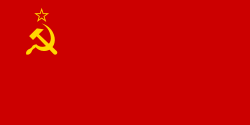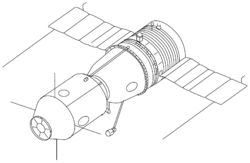Kosmos 1001
| Kosmos 1001 (Космос-1001) | |
| Modell | Sojuz 7K-ST Nr 4L[1] |
|---|---|
| Massa | 6 850 kg[1] |
| NSSDC-ID | 1978-036A[2] |
| Uppskjutning | |
| Startplats | Bajkonur 1/5[1] |
| Start | 4 april 1978, 15:07 UTC [1] |
| Raket | Sojuz |
| Landning | |
| Landning | 15 april 1978, 12:02 UTC |
| Omloppsbana | |
| Apogeum | 249km |
| Perigeum | 205 km |
| Banlutning | 51.6° |
Kosmos 1001 (ryska: Космос-1001) var en obemannad flygning i det sovjetiska rymdprogrammet. Farkosten sköts upp med en Sojuz-raket, från Kosmodromen i Bajkonur, den 4 april 1978.
Flygningens mål var att testa en modifierad version av Sojuz-T som var anpasad för flygningar till rymdstationerena Saljut 6 och Saljut 7.[3][4]
Farkosten återinträdde i jordens atmosfär och landade i Sovjetunionen den 15 april 1978.
Källor och referenser
- ^ [a b c d] Lafleur, Claude. ”Spacecrafts launched in 1978”. Spacecraft Encyclopedia. http://claudelafleur.qc.ca/Spacecrafts-1978.html. Läst 14 oktober 2013.
- ^ ”NASA Space Science Data Coordinated Archive” (på engelska). NASA. https://nssdc.gsfc.nasa.gov/nmc/spacecraft/display.action?id=1978-036A. Läst 28 februari 2020.
- ^ ”Soyuz-T 1 - 15 (7K-ST, 11F732)”. Gunther’s Space Page. http://space.skyrocket.de/doc_sdat/soyuz-t.htm. Läst 14 oktober 2013.
- ^ Sovjetunionens Rymdprogram. General Books. 2011. ISBN 978-1-23159-188-8
| |||||||||||||||||||||||||||||||||||||||||||||||||||||||||||||||||||||||||||||||||||||||||
Media som används på denna webbplats
Soyuz-A manned spacecraft concept (1963). It was to have been part of the Soyuz A-B-C circumlunar complex.
Apollo-Soyuz Test Project (ASTP) Soyuz. The APAS-75 docking unit is located at left.
Soyuz-TM spacecraft. Compare the antennas on the orbital module to those on Soyuz-T. Differences reflect the change from the Igla rendezvous system used on Soyuz-T to the Kurs rendezvous system used on Soyuz-TM.
The Soyuz TMA-04M spacecraft is seen after being rolled out by train to the launch pad at the Baikonur Cosmodrome in Kazakhstan, May 13, 2012. The launch of the Soyuz spacecraft, with Expedition 31 Soyuz Commander Gennady Padalka, Flight Engineer Sergei Revin of Russia and NASA Flight Engineer Joe Acaba, is scheduled for 9:01 a.m., May 15 (Kazakhstan time).









